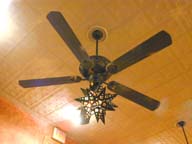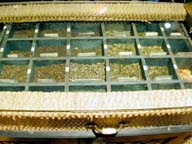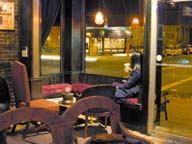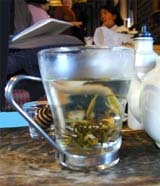Main content starts here.
![]()
![]()
When ordering coffee in America, you're always asked the above question. With increased concern for health in this country, especially when managing your health can also influence career advancement, more people are avoiding the higher blood pressure and stress caused by caffeine.
 |  |
| The light fixture in Tea Lounge with a beautiful mosaic lamp | You can see the many different varieties of tea leaves |
Naturally, there is demand for caffeine-free tea. Herbal tea such as camomile and peppermint tea have always been free of caffeine, but black and green teas are also available in decaf.
Caffeine
free green tea may sound off, but
I did discover "decaf sencha".
"There's always people asking for
decaf" says Greg, the owner of Tea
Lounge in Brooklyn. This cafe has
65 types of tea from around the
world. The decaf sencha, for example,
is made in China. Through a special
process, 98% of caffeeine is taken
out of the leaves.
 |  |
| You can see the many different varieties of tea leaves | Relaxing, watching the tea leaves swim in the cup |
Japanese tend to be accepting of natural flaws that come with things they eat and drink, like fat in ice cream and caffeine in beverages. So they say "Tea has caffeine, so don't drink too much late at night." In contrast, the American reaction is, as with fat in ice cream, "Tea has caffeine so let's take it out!" This difference in attitude might be representative of the two cultures. But, even with Japan's long relationship with green tea, we might ver well see decaf green tea in Japan too.
Reporter:Keiko Taniguchi
